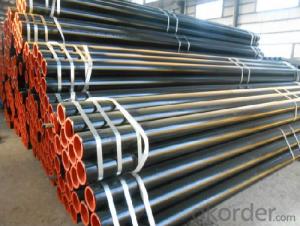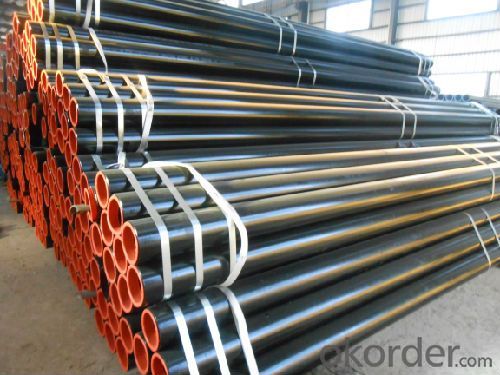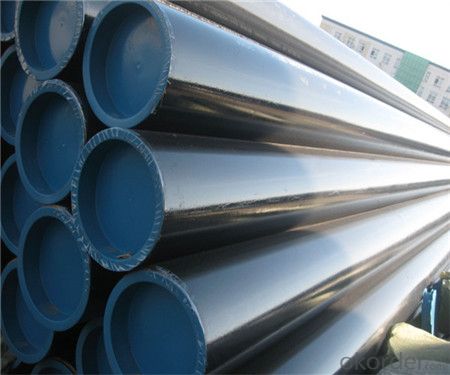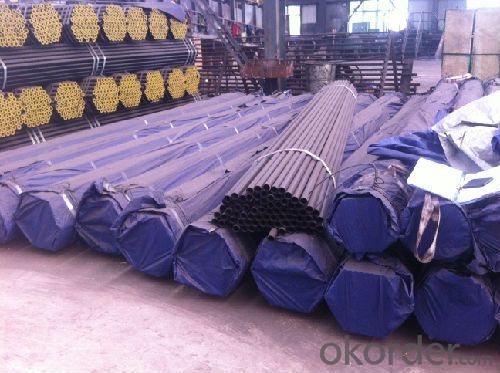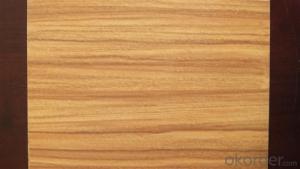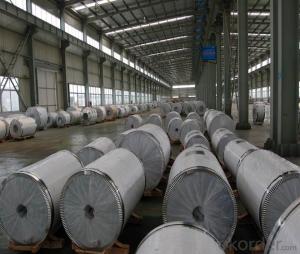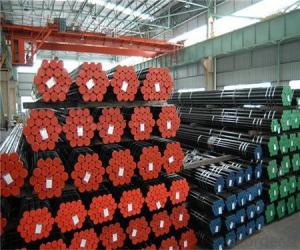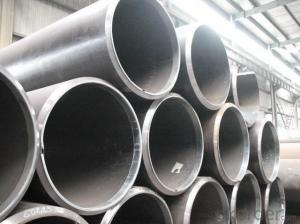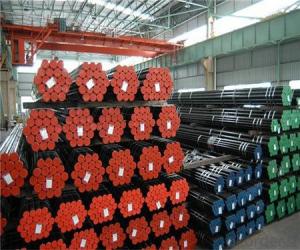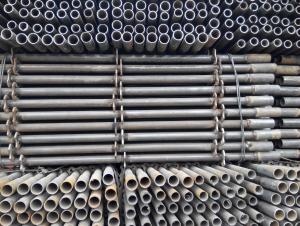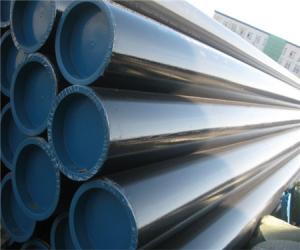50 Mil Aluminum Coil Coated Seamless Steel Pipe and Casing Tube / Apl Spec 5ct China
- Loading Port:
- China Main Port
- Payment Terms:
- TT or LC
- Min Order Qty:
- 30 m.t.
- Supply Capability:
- 12000 m.t./month
OKorder Service Pledge
OKorder Financial Service
You Might Also Like
1、Full series of products provides an easier access for one stop purchase
▲ Line pipe
▲ Tubing and casing
▲ L & M & H boiler tube
▲ Gas cylinder tube & pipe
▲ Mechanical & Structural pipe
▲ Ship-building tube & pipe
▲ Automobile tube & pipe
2、Main Features of the Seamless Pipe ASTM A106/53:
• High manufacturing accuracy
• High strength
• Small inertia resistance
• Strong heat dissipation ability
• Good visual effect
• Reasonable price
1.Seamless pipe professor
2.MTC,ISO,API certificate
3.ASTM,DIN,BS,JIS,GB
4.On time delivery
5.Big store,excellent package
3、Seamless Pipe ASTM A106/53 Specification:
Standard | GB, DIN, ASTM ASTM A106-2006, ASTM A53-2007 |
Grade | 10#-45#, 16Mn 10#, 20#, 45#, 16Mn |
Thickness | 8 - 33 mm |
Section Shape | Round |
Outer Diameter | 133 - 219 mm |
Place of Origin | Shandong, China (Mainland) |
Secondary Or Not | Non-secondary |
Application | Hydraulic Pipe |
Technique | Cold Drawn |
Certification | API |
Surface Treatment | factory state or painted black |
Special Pipe | API Pipe |
Alloy Or Not | Non-alloy |
Length | 5-12M |
Outer Diameter | 21.3-610mm |
Grade | 20#, 45#, Q345, API J55, API K55, API L80, API N80, API P110, A53B |
Standard | ASME, ASTM |
4、Packaging & Delivery
Packaging Details: | seaworthy package,bundles wrapped with strong steel strip |
Delivery Detail: | 15-30days after received 30%TT |
5、FAQ of Seamless Pipe ASTM A106/53:
①How is the quality of your products?
Our products are manufactured strictly according to national and internaional standard, and we take a test
on every pipe before delivered out. If you want see our quality certifications and all kinds of testing report, please just ask us for it.
Guaranteed: If products’ quality don’t accord to discription as we give or the promise before you place order, we promise 100% refund.
②How about price?
Yes, we are factory and be able to give you lowest price below market one, and we have a policy that “ for saving time and absolutely honest business attitude, we quote as lowest as possible for any customer, and discount can be given according to quantity”,if you like bargain and factory price is not low enough as you think, just don’t waste your time.Please trust the quotation we would give you, it is professional one.
③Why should you chose us?
● Full series of products provides an easier access for one stop purchase
▲ Electric Resistance Welded (ERW) Steel Pipe
▲ Longitudinal Submerged Arc Welded (LSAW) Steel Pipe
▲ Spiral Submerged Arc Welded (SSAW) Steel Pipe
▲ Hollow Section (Square and Rectangle Pipe)
▲ Hot Dipped Galvanized Steel Pipe
▲ Professional sales team
▲ Professional engineering and technology team
▲ Professional exportation and contract processing/management team
▲ Professional cooperators and partners
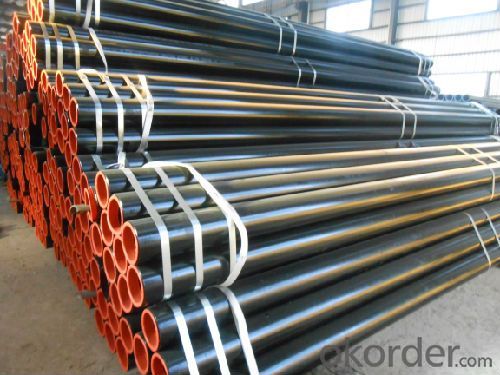
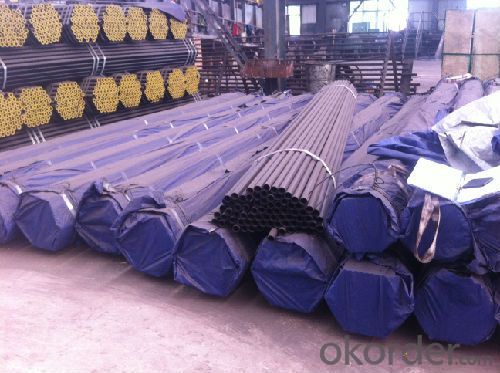
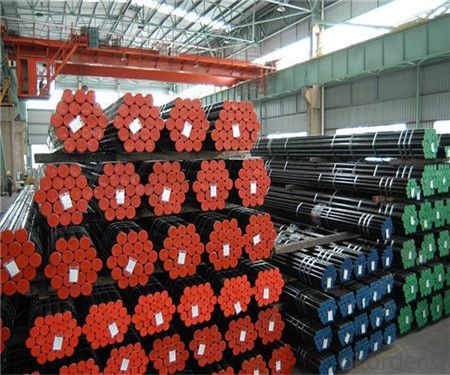
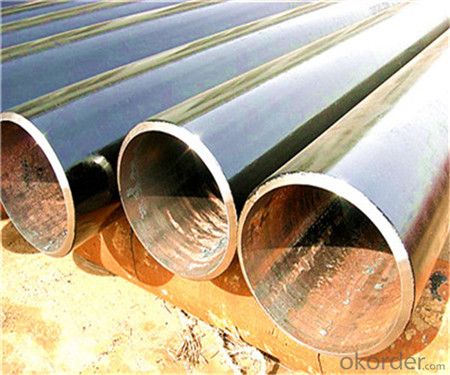
- Q: Is there any specific legislation or rules governing the use of aluminum coils in public areas?
- <p>There are no universal special regulations for using aluminum coils in public places. However, regulations can vary by country, state, or even city. In some cases, building codes or safety regulations might dictate the use of certain materials, including aluminum coils, in construction or other applications within public spaces. It's important to check local regulations and guidelines to ensure compliance when using aluminum coils in public areas.</p>
- Q: What are the common installation methods for aluminum coils?
- The common installation methods for aluminum coils include direct attachment, concealed fastening, and interlocking panel systems.
- Q: How to use aluminum sheet to roll a 12m-long aluminum coil with a diameter of 184cm?
- According to project experience, first you should check the specification of the aluminum sheet and then design crafts such as connection method, installation and transportation according to equipment.
- Q: I was told today that taking aluminium inside your body greatly increases the chance of getting alzheimers as they destroy cells. What foods contain aluminium?
- i dont think any foods will contain substantial quantities of aluminium as its not a metal commonly found in bioinorganic chemistry. Aluminium salts could potentially be found in water, also using aluminium pans could potentially lead to aluminium consumption. hope this helps
- Q: Are there any restrictions on the coil thickness of aluminum coils?
- Aluminum coils usually have restrictions on their thickness. The specific restrictions vary depending on the intended use and industry standards. Generally, the thickness of aluminum coils is limited by the capabilities of the manufacturing equipment and the desired end product. Applications that require flexibility, such as foils or flexible packaging materials, often prefer thinner coils. Conversely, industries like construction or automotive, where strength and durability are crucial, commonly use thicker coils. Availability and cost of raw materials may also limit the thickness of aluminum coils. Manufacturers must adhere to these restrictions to guarantee the quality and performance of the final product.
- Q: Can aluminum coils be formed into different shapes?
- Yes, aluminum coils can be formed into different shapes through various processes such as bending, rolling, or stamping.
- Q: Are there any limitations to the maximum coil length of aluminum coils?
- The maximum length of aluminum coils is subject to certain limitations. Factors that affect the maximum coil length include the thickness and width of the coil, the strength and tensile properties of the aluminum alloy, the equipment used for coil processing, and the intended application of the coil. One limitation is the strength and ductility of the aluminum alloy. Aluminum alloys with higher strength and lower ductility may have restrictions on the maximum coil length due to the risk of coil breakage or deformation during processing or handling. Another limitation is the coil processing equipment. The maximum coil length is often determined by the size and capabilities of the equipment used for slitting, cutting, or forming the coils. If the equipment has limited capacity or is not designed for longer coils, it may not be able to effectively handle or process longer lengths. The intended application of the coil can also impose limitations. For example, in the automotive industry, there may be restrictions on the maximum coil length based on the size and weight limitations of the vehicles. Moreover, logistical factors such as transportation and storage can also impose limitations. Longer coils may be more challenging to handle, transport, and store, which can increase the risk of damage or pose challenges in terms of logistics and space requirements. Therefore, it is crucial to consider various factors such as alloy properties, equipment capabilities, application requirements, and logistical considerations to determine the practical limitations of coil length for a specific situation, as there is no specific universal limit to the maximum coil length of aluminum coils.
- Q: Are aluminum coils compatible with different joining methods?
- Yes, aluminum coils are compatible with different joining methods. Aluminum is a highly versatile metal that can be joined using various techniques such as welding, brazing, soldering, and mechanical fastening. The choice of joining method depends on the specific application and the desired properties of the joint. Welding is commonly used to join aluminum coils as it provides a strong and durable bond. Several welding techniques like MIG (Metal Inert Gas), TIG (Tungsten Inert Gas), and resistance welding can be used depending on the thickness and type of aluminum alloy being joined. Brazing is another effective method for joining aluminum coils. It involves the use of a filler material that has a lower melting point than the base metal, which is heated to create a strong joint. Brazing is commonly used when the aluminum coils need to be joined to other dissimilar metals. Soldering is suitable for joining thin aluminum coils or when a lower temperature method is required. It involves melting a low-temperature alloy (solder) to join the coils together. Soldering is commonly used in electronics and plumbing applications. Mechanical fastening methods such as bolts, screws, rivets, or clips can also be used to join aluminum coils. These methods provide a reliable and removable joint, making them suitable for applications where disassembly may be required. In summary, aluminum coils are compatible with various joining methods, including welding, brazing, soldering, and mechanical fastening. The choice of joining method depends on factors such as the application, the type of aluminum alloy, and the desired properties of the joint.
- Q: What are the weight and thickness options for aluminum coils?
- The weight and thickness options for aluminum coils can vary depending on the specific needs and requirements of the project or application. Generally, aluminum coils can range in weight from a few hundred pounds to several thousand pounds, while the thickness can range from a few millimeters to a few inches. It is important to consult with a supplier or manufacturer to determine the appropriate weight and thickness options based on the intended use of the aluminum coils.
- Q: What are the typical delivery methods for aluminum coils?
- The typical delivery methods for aluminum coils include shipping via truck or rail, as well as air freight for urgent or long-distance deliveries.
Send your message to us
50 Mil Aluminum Coil Coated Seamless Steel Pipe and Casing Tube / Apl Spec 5ct China
- Loading Port:
- China Main Port
- Payment Terms:
- TT or LC
- Min Order Qty:
- 30 m.t.
- Supply Capability:
- 12000 m.t./month
OKorder Service Pledge
OKorder Financial Service
Similar products
Hot products
Hot Searches
Related keywords
